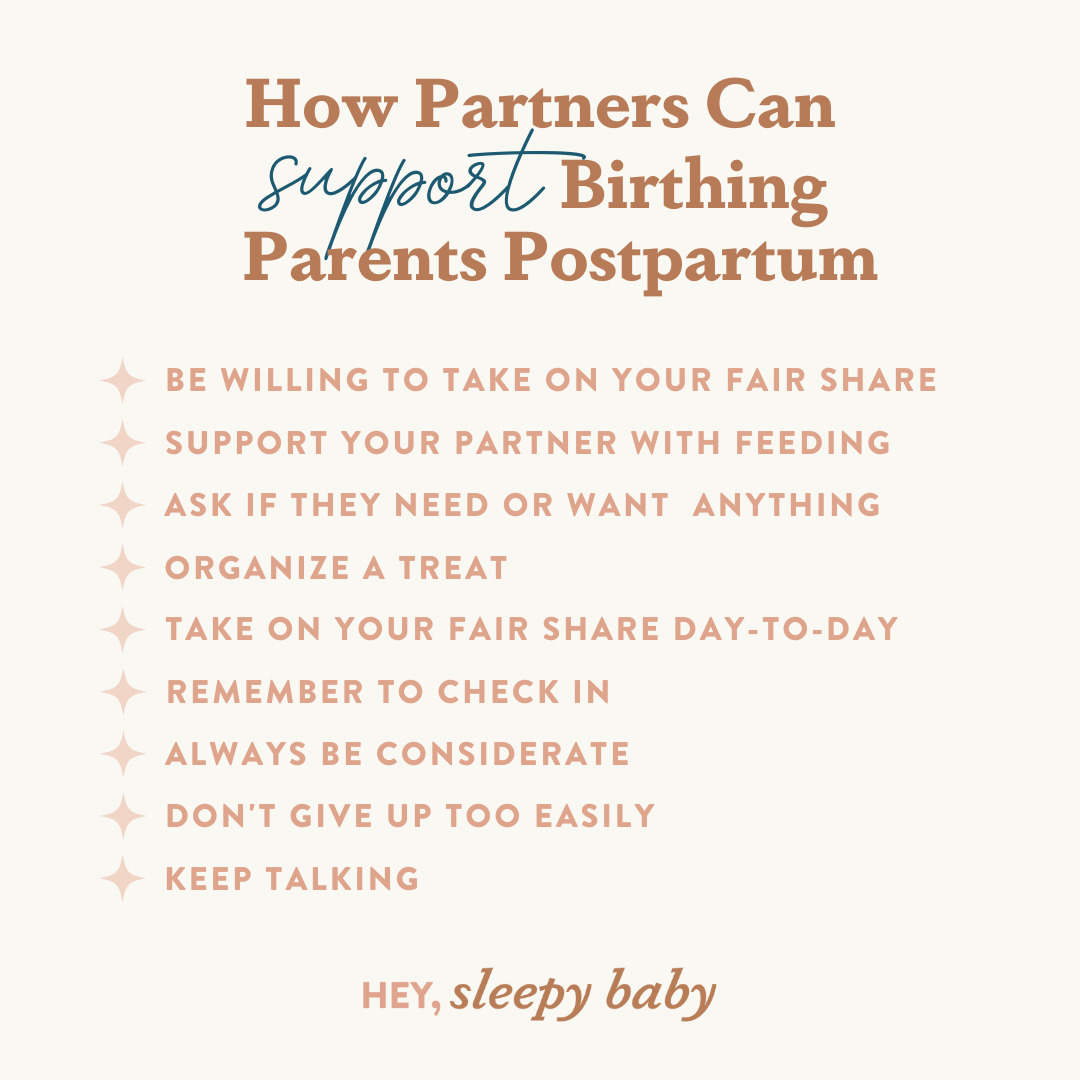I'm Rachael
Mom of 3 & Baby Sleep Expert with Big Sis Energy
& I’VE DONE ALL THE RESEARCH FOR YOU ALREADY.
Better sleep for the entire family
BROWSE COURSES
hey!
How Partners Can Support Birthing Parents Postpartum | Hey Sleepy Baby
Wondering how to help your partner after they give birth? Discover some of the best ways to support your partner and bond with your baby here.
If your partner has recently delivered your child, you might be wondering how to support your partner after birth. (Hint – if you’re not, you should be!)
As the non-birthing parent, it can be difficult to see how you fit in, especially if the birthing parent is nursing. But don’t worry, there are plenty of ways for you to get involved, support your partner, and bond with your new baby.
Whether your partner gave birth vaginally or via cesarean section, they will experience pain and bleeding for several weeks after the birth. Add in a hefty dose of hormones and it’s easy to see why your goal needs to be doing anything you can to make their life easier.
In this blog post, we’ve outlined a few simple ideas to help make the transition to parenthood a little easier for everyone. You might even bag a few brownie points along the way!
Be willing to take on your fair share
If your baby is bottle-fed, agree on a night feeding schedule that works for you and your family. If you’re working full-time during the week, you could cover the Saturday night wakings to allow your partner the luxury of a half-decent night’s sleep.
If you’re lucky enough to have a spare room, consider taking it in turns to sleep in there. It’s not forever, and it might help you both to get the sleep you need in the early days. Every family is different, so talk to your partner and experiment to decide on what will work best together.
If your baby is nursing and your partner is handling the night feeds, you might offer to take the baby immediately after the first morning feed. Whether this is possible will depend on your baby’s age and temperament – and it will also dictate what you’re able to get done.
Some babies just love to be held, while others are pretty independent from an early age. Try a few different things to learn what they enjoy. You might take the baby for a walk in the stroller, or prepare some breakfast while they hang out in the baby carrier or sling. If they’re happy being set down in a safe space, bring the Moses basket or travel crib to the kitchen, or lay them down with a few toys on the playmat. If you need to take a shower, try strapping them safely in their bouncer chair in the bathroom – just remember to place them where they can still see you.
It’s the little things that really make a difference here. If you’re working full time, it can be all too easy to think that all the baby care should fall onto your partner. But looking after a baby is a full time job in itself, so it’s vital that you share the load. Even if your partner only gets 30 minutes of alone time, it can make a real difference to their sanity. Reframe it as your own special time to bond with the baby. The best part? The baby will probably be in a better mood first thing in the morning than when you arrive home from work during ‘witching hour’!
Support your partner with breastfeeding or chestfeeding
If your partner is breastfeeding or chestfeeding, it can feel difficult to find ways to help. But there are so many things you can do to provide valuable support. If they’re struggling with the baby’s latch, there are hundreds of online videos and resources online. Educate yourself and ask them if they would like you to help with positioning. Observing as a third-party can offer help to identify issues that the person actually feeding might not notice.
Ask if they want to see a lactation consultant – and if the answer is yes, make the arrangements on their behalf. Go along to the appointment and listen to the advice that’s given, so you can help afterwards back at home. If they’re pumping, get the breast pump ready for when they need it. Set up the feeding pillow, research the best nursing bras, and stock up on nursing pads. Above all, listen to their needs.
Ask if they need or want anything
Some people love breastfeeding or chestfeeding. For others, it can seem like a real chore. In the early days, the person feeding the baby can feel as though they’re stuck to the sofa all day long, especially when the baby falls asleep immediately after nursing. Simply asking if there’s anything they need or want is a great way to show your support. It might be something simple, like a drink or snack, or they might need you to connect their phone charger or pass them the TV remote. Whatever it is, let them know you’re on hand to help out.
My daughter is so deeply engaged with these story lines and watches and listens to me with a huge concentration. I use her dolls house and our routines and stories and play to help her explore her feelings around situations. Through role play children learn to become socially competent, self-regulate and develop an emotional tool kit. It’s a wonderful space for children to practice coping strategies for things they are to face in reality. With adult help, children are able to access a more advanced level of this as they process more complex emotional situations. I have found this mixture of using droplets of her life and really emphasizing all the things she is familiar with the most effective tool for helping her prepare for change. My daughter adapted really well to having daddy do more of her routines and talked about it with us a lot. Although it wasn’t her preference to have daddy put her to bed, it wasn’t a change that she found scary or unsettling and helping keep her emotional world secure was really important to us.
We are planning to night wean this next month and so together with stories and role play I will be supporting my daughter emotionally through this huge transition.

Organize a treat
It doesn’t have to be anything extravagant, but showing your appreciation is so important, especially during those early days. Their favorite takeout, a bunch of fresh flowers, or a magazine subscription – whatever you pick, small gestures really can make all the difference. Oh, and ensure they always have a regular stream of easy-to-eat food. Whether it’s bagels, fruit, cheese, or granola bars, choose things that will be easy to eat with one hand.
Take on your fair share of the day-to-day
Take on everyday tasks including diaper changes, getting baby dressed, and grocery shopping. Instead of asking ‘what’s for dinner’, take responsibility for the weekly meal plan. Invest time in batch cooking over the weekend, or stock up on easy-to-cook meals from the supermarket. Can’t cook? There has never been a better time to learn.
Above all, avoid thinking that the parent ‘at home all day’ should be the one responsible for preparing all the meals. Multi-tasking in the early days is hard work, so cut them some slack. Chances are, they’ll master it by the time they have a second or third baby, but it’s definitely not easy.
Finding time to get to the grocery store can be impossible, even if it looks like they’re at home all day. Getting basic tasks done is entirely dependent on the baby’s needs, temperament, and mood. That includes cleaning, too. Don’t expect to return to a showhome every night. You’ll need to pick up some of the housework, or organize a cleaner to help out.
Even if your partner is breastfeeding or chestfeeding, you can still get involved with the associated tasks. Do your research and learn everything you can about sterilizing, storing expressed milk, and making up formula feeds. If your work schedule means you can’t take on much of this work during the week, step up and take responsibility over the weekend. Take on some of the mental load too – don’t always expect your partner to be the one who knows how many sterilized bottles are in the cupboard.
Remember to check in
Spending all day with a baby or young children can be enough to drive anyone crazy. And if your baby is fussy, it can be even harder. Your partner will be desperate for adult interaction, and if they’re finding it difficult to get out of the house, a text or phone call will help keep their spirits up. When you arrive home, let them vent if they need to. And if they’re really struggling, take the baby and let them have a little time on their own.
Always be considerate
‘Baby brain’ is a phrase that gets thrown around a lot, but it’s more than that.
As the primary caregiver, your partner is taking on the bulk of the mental load. And they’ll also be thinking about a lot of other stuff.
They might be anxious about when their milk will come in, or if it will at all. They might be worried about the baby’s feeding pattern, or whether they’re taking in enough milk. If the baby’s poop is a different color, this might be weighing on their mind. There’s so much to worry about when you’re looking after a tiny new baby full time. Add in a hefty dose of sleep deprivation, and it’s no wonder they might end up being a little snappy at times.
Recognize that they’re exhausted. Allow them to feel seen, and offer practical help to make things easier for them.
Don’t give up too easily
If your partner is nursing, it can seem all too easy to just hand the baby back to them when they start fussing. After all, they’ve spent the last nine months carrying the baby and developing a bond, and nursing often is the solution. That said, it’s best to avoid immediately giving the crying baby to your partner. Instead, try to adopt a confident approach to the situation. Keep your cool, and try to be reassuring – both to your partner and the baby.
Even if you’re not lactating, there are still plenty of ideas to try when it comes to soothing a grumpy baby. Singing a song, reading a soothing story, or even just pulling a funny face can often provide them with a welcome distraction. Sure, it might not always work, but always show that you’re willing to try.
Keep talking
The newborn stage can be difficult for both parents, especially if it’s your first baby. If you’re struggling to adjust to life with a baby, be sure to talk to your partner about how you’re feeling. Sharing the load and saying how you feel is the best way to maintain open lines of communication during this tricky phase – but you’ll all emerge from it happily if you’re able to keep talking.
Was This Helpful? Save It For Later!

binge reads
We think you'll love these
You deserve to the
baby stage, not just "survive it."
And you DON'T have to sacrifice your values, ignore your instincts, or force yourself to follow a method you don't align with just to get your baby back to sleep.
I’m here to help you create a restful, sustainable sleep environment that honors both your baby’s needs AND your own (without the stress OR the guilt!) because, no, you don’t have to choose between the two.
enjoy!
BABY SLEEP COURSES →
BABY SLEEP CONSULTS →
Wish you could help your baby sleep better without resorting to sleep training? Download my FREE guide to a good night’s sleep and learn 8 simple, science-backed tips for supporting your child’s needs.
Traditional sleep training methods don’t have to be your solution to better sleep.
SLEEP TRAINING ISN’T THE ONLY WAY TO GET GOOD SLEEP
Hey, I'm Rachael and Hey, Sleepy Baby is for parents who want to get their nights back, without sleep training their babies.
NO ONE TOLD US POD
explorING the untold truths of parenting







